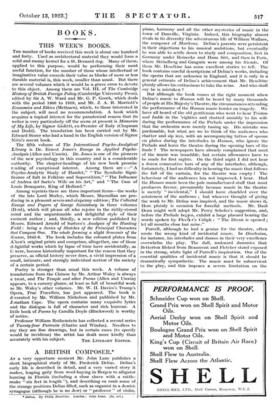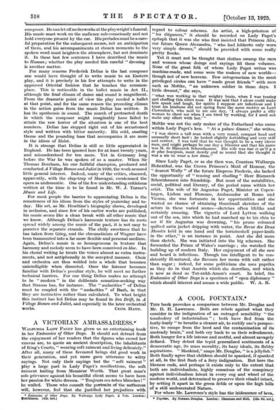A BRITISH COMPOSER.* AT a very opportune moment Mr. John
Lane publishes a short biographical study of Mr. Frederick Delius. Delius's early life is described in detail, and a very varied story it makes, leaping gaily from wool-buying in Bergen to alligator hunting in Florida (including a close shave with a rattle- snake "six feet in length "), and describing en route some of the strange positions Delius filled, such as organist in a Jewish synagogue (although he is no Jew) or " professor " of violin, • Delius. By Philip HeseRino, London John Lane. Les. not.]
piano, harmony and all the other mysteries of music in the town of Danville, Virginia. Indeed, this biography almost rivals in its diversity the adventurous life of William Wallace, the composer of Maritana. Delius's parents were persistent in their objections to his musical ambitions, but eventually he was able to settle down to study and composition, first in Germany under Reineeke and Hans Sitt, and then in Paris, where Strindberg and Gauguin were among his friends. Of them Mr. Heseltine has some excellent stories to tell. The book contains" careful descriptions of Delius's works, including the operas that are unknown in England, and it is only in a general estimate of Delius's achievement that Mr. Heseltine plainly allows his enthusiasm to take the reins. And who shall say he is mistaken ?
But although the book conies at the right moment when Delius's music to Hassan will be heard by many thousands of people at His Majesty's Theatre, the circumstances attending the performance of the Hassan music border on tragedy. We have all heard of the old gentleman who went to hear Tristan and Isolde in the 'eighties and chatted amiably to his wife during the performance of the Prelude under the impression that the orchestra were merely tuning up. His mistake was pardonable, but what are we to think of the audiences who chatter and sip ices, with an accompanying tattoo of spoons on plates during the interludes in Hassan, who ignore the Prelude and leave the theatre during the opening bars of the finale ? The newspapers have already complained that most of the music was inaudible, but certain allowances have to be made for first nights. On the third night I did not hear a dozen consecutive bars of any of the interludes, although, fortunately, I had no difficulty in hearing the music that follows the fall of the curtain, for the theatre was empty The behaviour of the audiences has not improved, I hear. Had the Hassan music been the pale manufactured stuff that most producers favour, presumably because music in the theatre is merely "incidental," I should have chuckled over the astuteness of the audience ; but whoever thought of giving the work to Mr. Delius was inspired, and the music shows it. Here plainly is occasion for forceful methods. Mr. Basil Dean might well adopt Mr. Percy Scholes's suggestion, and, before the Prelude beg-is, exhibit a large placard bearing the words spoken by Flecti l.'s Caliph : "The Divan is opened ; let all mouths close but mine."
Purcell, although he had a genius for the theatre, often wrote the wrong kind of incidental music. In Diocletian, for instance, his interludes and dances in their very excellence overwhelm the play. The dull, awkward dummies that Betterton filched from Beaumont and Fletcher stand exposed in the strong, white light of Purcell's inspiration. One of the essential qualities of incidental music is that it should be dramatically sympathetic. The music must be subservient to the play, and this imposes a severe limitation on the composer. He can let off no fireworks at the playwright's funeral. His music must work on the audience sub-consciously and not hold everyone present by the ear. His preludes must be a care- ful preparation for the subsequent scenes, not an anticipation of them, and his accompaniments at chosen moments lo the spoken word must heighten the atmosphere, but not dominate it. In these last few sentences I have described the music to Hassan ; whether the play needed this careful "dressing is another matter.
For many reasons Frederick Delius is the last composer one would have thought of to write music to an Eastern play, and it is precisely in his few attempts to write in the approved Oriental fashion that he touches the common- place. This is noticeable in the ballet music in Act II., although the final climax of dance and sound is magnificent. From the dramatic point of view the play needed a ballet at that point, and for the same reason the preceding climax in the action gains from the music Delius has written. It has its apotheosis in sound. The march of protracted death in which the composer might imaginably have failed to attain the raw horror of the situation is one of the best numbers. Delius has stepped right out of his accustomed style and written with bitter austerity. His cold, snarling theme and the pounding bass that accompanies it are more in the idiom of Hoist.
It is strange that Delius is still so little appreciated in England. He has been ignored here for at least twenty years, and misunderstood for ten more. Yet in Germany long before the War he was spoken of as a master. When Sir Thomas Beecham, his one faithful champion, produced and conducted A Village Romeo and Juliet in 1920, the work aroused little general interest. Indeed, many of the critics, obsessed, apparently, with the clap-trap of Mascagni, condemned the opera as undramatic. One of the few understanding criticisms written at the time is to be found in Mr. W. J. Turner's Music and Life.
For most people the barrier to appreciating Delius is the remoteness of his idiom from the styles of yesterday and to- day. His art, as Mr. Heseltine's biography shows, developed in seclusion, and since few of his earlier works are published, his music seems like a clean break with all other music that we know. Although Delius's harmonic texture has its roots spread widely among the music of the past, it is not easy to perceive the separate strands. The chilly sweetness that he has taken from Grieg, and the chromaticism of Wagner have been transmuted into a far more flexible and personal medium. Again, Delius's music is so homogeneous in texture that harmony and melody seem to have been conceived en bloc. In his choral writing he treats the voices almost as extra instru- ments, and not antiphonally in the accepted manner. Choir and orchestra are thus welded into a whole that becomes unintelligible when dissected. Once the listener becomes familiar with Delius's peculiar style, he will meet no further technical barriers. For one thing Delius makes no attempt to be " modern " in the deliberate sencntion-seeking way that Strauss has, for instance. The " audacities " of Delius must be coupled with the " audacities " of Bach, in that they are instinctive rather than calculated. To what height this instinct has led Delius may be found in Sea Drift, in A Village Romeo and Juliet, and especially in the later orchestral



























































 Previous page
Previous page